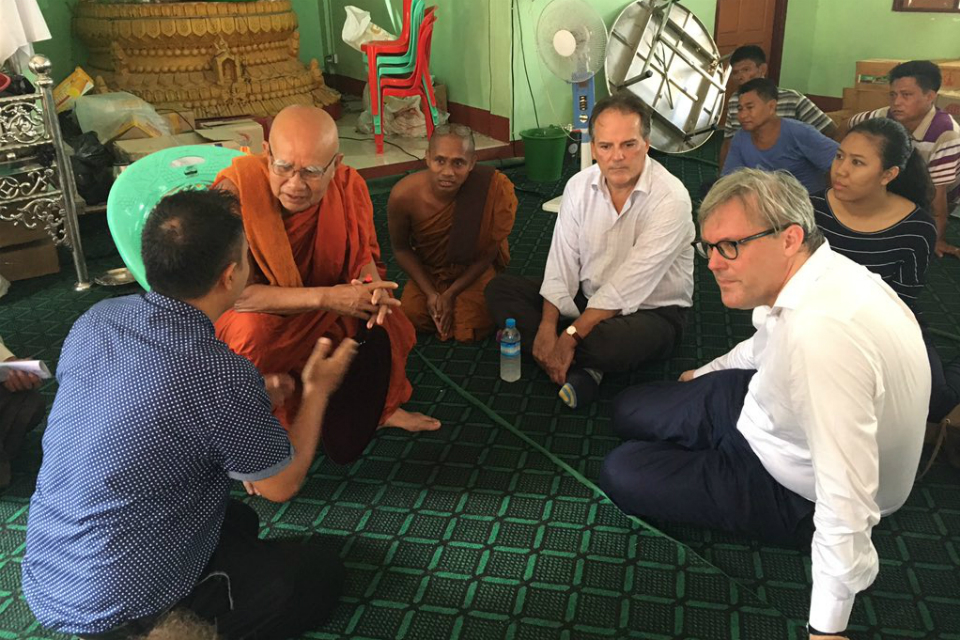Burmese military to blame for humanitarian crisis facing Rohingya: article by Mark Field
Writing for Sky News, Minister for Asia and the Pacific Mark Field says that Aung San Suu Kyi must ensure safe repatriation of refugees fleeing Myanmar.

I visited Rakhine in September – the first Western minister to do so since the current phase of the crisis began. I heard horrifying descriptions of murder, rape and other human rights violations.
What is happening there looks like ethnic cleansing.
With hundreds of thousands of Rohingya having arrived in Bangladesh since 25 August, the immediate focus for the international community must be to ensure the provision of humanitarian aid to them and to those displaced within Rakhine. But once the immediate crisis has abated, those who have fled must be able to return safely to their homes.
Minister Field visited Rakhine State in September
Mark Field visits Rakhine State, Burma
I am proud of the compassionate leadership Britain has displayed as the largest bilateral donor to this crisis. We have pledged a total of £47 million in humanitarian assistance so far. This includes the provision of emergency food to 174,000 people and lifesaving nutritional support to more than 60,000 children under 5 years old and 21,000 pregnant and breastfeeding women.
In Rakhine itself, we are still pressing the Burmese authorities to grant full humanitarian access to affected areas and have provided £1 million and £2 million to the Red Cross and World Food Programme respectively.
We have acted as a figurehead, wielding our global influence for good by encouraging other major donors. The UK has also led the international community’s political and diplomatic response to the Rakhine crisis.
Last Monday, the UN Security Council adopted a presidential statement on Burma proposed by the UK and France. The statement demanded an immediate end to the use of excessive military force in Rakhine and greater access for the provision of humanitarian aid.
But it also recognised that for the Rohingya to be able to return home, safe passage must be guaranteed. As Kofi Annan’s Rakhine Advisory Commission report also makes clear, the citizenship status of the Rohingya must be resolved and restrictions on their freedom of movement must be lifted.
I made all of these points directly to Aung San Suu Kyi when I saw her in Burma in September.
Jonathan Allen, UK Deputy Permanent Representative to the United Nations welcomes Security Council statement on Burma
UNSC Presidential Statement on Burma
We are clear that the Burmese military are responsible for this humanitarian crisis. They must heed the Security Council’s calls and they must cooperate with the UN Human Rights Council’s fact finding mission, which aims to establish exactly what has taken place in Rakhine.
One appalling aspect of the current situation is the extensive reporting we have received of sexual violence. A lead member of the FCO’s Preventing Sexual Violence in Conflict Initiative (PSVI) recently visited the region alongside the UN to meet survivors, support workers, and government officials.
UK funding has helped to ensure that counselling and psychological support will reach around 10,000 women and more than 2,000 survivors of sexual violence in the refugee camps in Bangladesh. We are also deploying 2 UK experts in sexual violence and supporting further UNICEF initiatives to protect children.
We must continue to preserve and reinforce Burma’s fragile transition to democracy, while recognising that the pace of that transition will not be as swift as we might have hoped.
Ms Suu Kyi has publicly supported the safe repatriation of refugees. She must do everything she can to make this happen.
But her powers to enforce this are limited. Prejudice against the Rohingya in Burma is deep-rooted. Ms Suu Kyi does not exert control over the Burmese military as the constitution makes them independent of the civilian government. She remains central to Burma’s democratic transition.
The UK will continue to support civilian government in Burma as the best hope to ensure the fair treatment of the Rohingya and respect for human rights across the country in the future.
Read more about how the UK is supporting survivors of sexual violence against the Rohingya in Burma.